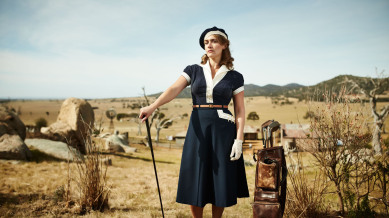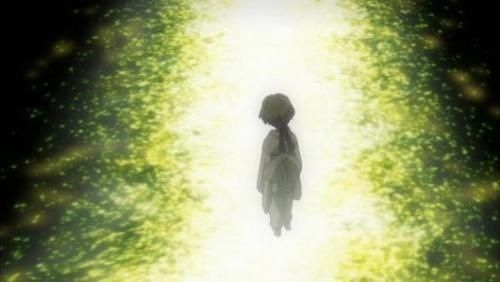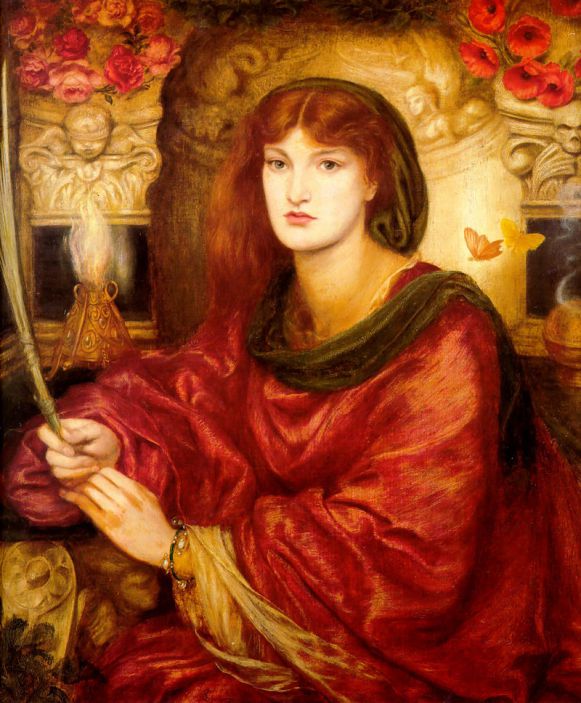
His birth came about by trickery and subterfuge, although the boy knew it not.
A birth by accident, a birth of inconsequence. Or so all the world would think. It was an arrangement of my Uncle Merlin and the plan was thus: That I, the Duchess Igraine of Tintagel should lie in the adulterous bed of King Uther Pendragon, so that I be the vessel to bear a son. His name would be Arthur.
O now, you must understand. The part about adultery scarcely vexed me; my marriage to the Duke of Tintagel was an arranged and loveless one. The bed of Uther Pendragon was not my first straying and would not be my last. I was fully compliant in my dalliance. Yet for the sake of my honor, Merlin thought it best that the bards which would tell this story say I had been bewitched. The official version? Uther Pendragon appeared to me in the form of my husband the Duke. Therefore when I laid with him I was judged innocent in all wrongdoing.
O that was rich! One cannot bewitch a witch! My Uncle Merlin knew this better than anyone.
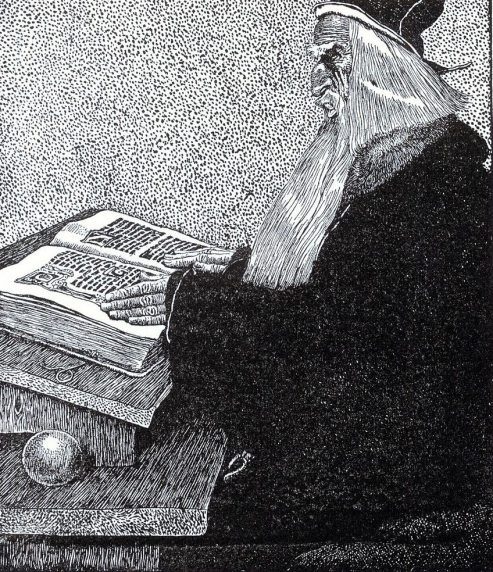
Heretofore my husband, the Duke of Tintagel had been of stout health. Now suddenly he took ill and died promptly. As a widow with child I had no choice but to wed Uther Pedragon. I then became Queen Igraine of castle Camelot.
The birth was easy. But what I could not abide, what I could not forgive, was that the baby was wrenched from my arms the very moment he uttered breath! I barely had the chance to hold him before Merlin spirited him away, insisting I was not fit to raise him, and that his future tasks were not to be influenced by the likes of me.
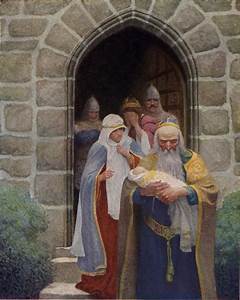
Without conversation nor consultation, it was decided Arthur be raised by a local lord, one Sir Ector.
“Now Igraine,” Merlin bid me, once the deed was done. “You need not worry for your son. His every want shall be provided for, as my Lord Ector leads a life of prosperity and gain. Arthur shall have an older brother named Kai and a mother of great gentleness, the Lady Ector. He shall be fed, clothed and schooled properly. It is essential he live among common men.”
Foolish wizard! Could Merlin not see that a woman’s greatest loss was that of her own child? His was a silly scheme, for I knew my son Arthur was like no other boy! He needed no guidance from the common man, for his true nature would allow him to encompass all. His bloodline was mine; that of Avalon. His schooling should thus involve the magick of Avalon.
I vowed revenge upon my Uncle Merlin. He’d pay for his injustice! My visits to Avalon would ensure this. I studied under tutelage of the Lady of the Lake, imploring the water and rocks to bring me power.

Fourteen years passed, and they were fourteen years of war and devastation. The Saxon armies invaded our territory time and time again. My husband Uther, weary of the constant battle, finally took ill and passed away, leaving his kingdom up for grabs among rogue warlords and enemies.
As king’s consort I managed best as I could. The men bickered among themselves, calling privy council after privy council to determine who should be the next king. Arthur should have been immediately declared so. But because of Merlin’s harebrained scheme, he had been raised as a ward, away from his true home. If he were to return to Camelot now and claim the throne, none would believe him.
The people of Britain at that time were a superstitious lot. They believed in marvels and miracles, great quests of honor and the divine right of princes. It was for this reason that I devised a scheme which would place my son upon the throne without doubt or question.
The Bishop of Canterbury, influenced by my Uncle Merlin, deemed a joust should be held to determine the new king. It would take place on New Year’s Day, 443, the year of Our Lord.
This, in and of itself, was a most outrageous and foolish notion! Jousting was a putrid and violent sport; it brought no good to anyone. Within it, perfectly capable and healthy men were maimed and wounded, leaving them disabled and unfit for battles against our true enemies! Jousts were held so that jeering and bloodthirsty crowds could name what they thought ‘a hero’. He that could withstand a horse’s back and the jab of a lance.
“But Arthur will surely win the joust,” Merlin insisted. “It is a most excellent plan!”
“Arthur is a boy of fifteen!” I spat. “I’ll not see him crippled in a joust. It is a most preposterous plan!”
I objected vehemently. Yet as a woman, my word held no weight. Instead I used my own sorcery to produce a most ingenious scheme, one that no one would question.
The people of Camelot were obsessed with weaponry and feats of strength. I reasoned that there must be some deed which could measure one’s power, yet bear no damage to another. A deed which would test a man’s ability over nature, over fear, over all elements. A test which would show, beyond any doubt, that the man able to perform it would indeed be the new king.
I retreated to my crystal cave for a period of deep meditation.

There, among the rocks and water, I called upon my ancestors to guide me. I consulted the goddess Cerridwen, the Morrigan, Viviane and the tribe of eternal Wise Women. Finally, the idea came to me. I told no one of my plan.
Outside the field where the great joust was to be held, I created a boulder. Upon that boulder I placed an anvil of pure iron. (All this time I relied upon my own witchery, for no mortal woman could have lifted such a boulder, nor the anvil.) I then fashioned a great silver sword, its blade sharp enough to slice the head of a boar, its handle heavy as the anvil itself. Within the anvil I inscribed the following directions:
“Whosoever can pull this sword from its stone shall be the undoubted, indisputable, indubitable King of Britain, deemed to rule for his lifetime and never questioned of his authority.”
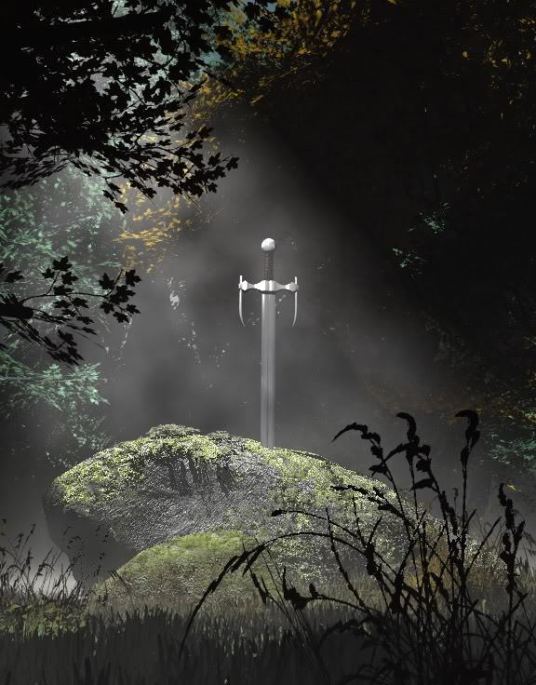
New Years Day dawned, the morning of the joust. Spectators gathered. They stared with gaping mouths at the sword in the stone.
“Can it be?” they muttered among themselves. “The new king will be decided by pulling a sword from a stone? Such a simple task?”
“Simple task indeed!” I retorted hotly. “Go on then! Try your hand at it and see. Whoso among you dares to attempt this feat?”
One by one the men tried. There were knights and lords, men of great status as well as serfs and peasants who stood in line and attempted to lift the sword. Each effort was for naught.
Finally, Sir Ector rode up with his son Kai and Arthur in tow.
“Will you attempt the task, my Lord?” I said coyly to Ector, for – goddess help me – I could not resist a good prank.
Eagerly the man placed his grip upon the sword’s handle. Twist and tug as he might, the sword would not budge. Sweat burst from his brow until finally he gave up. “It will not move!” he yelped exasperatedly. “The thing is stuck like an oak to the soil.”
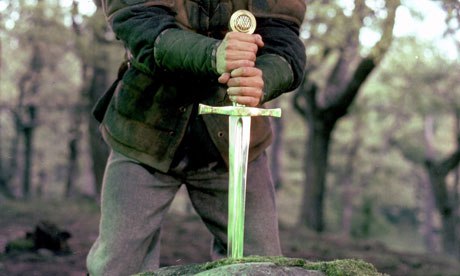
“Mayhap your son Kai shall attempt it,” I said, barely hiding my smirk.
Kai groped and toiled. The stubborn blade would not budge. He too broke a sweat before declaring, “It is an impossible task! One hundred men could not lift it!”
“And what of young Arthur?” I asked.
“If I and Kai could not lift it, all the more impossible it will be for Arthur,” said Sir Ector. “For I am a knighted lord; I have seen battle. My ward Arthur, abandoned at birth, has lead only the life of a farm hand. He knows nothing of weaponry.”
“Oh doesn’t he?” I chided. I could hold my anger no longer.
“For your information,” quothe I, “he was NOT abandoned at birth! Ever did you think he was taken from his mother’s arms, through no will nor decision of her own? Ever did you think he was intended for greater purposes, such that you, Sir Ector, could not possibly know?”
Ector looked at me dumbfounded, for it was unseemly for a widowed queen to speak so boldly. I cared not what they thought! I then took Arthur by the hand and helped him down from his horse. “You will try it,” I commanded.
Arthur’s eyes narrowed, then popped in recognition as he faced me. “Is it you?” he asked softly. “You are my… Mother?”
None had known of my secret visits to Ector’s farm. None had known, save Arthur and myself, that in the still of the night I had come to him. Together we’d board a small boat and I’d take him to Avalon, so that he could learn of his true bloodline and power.
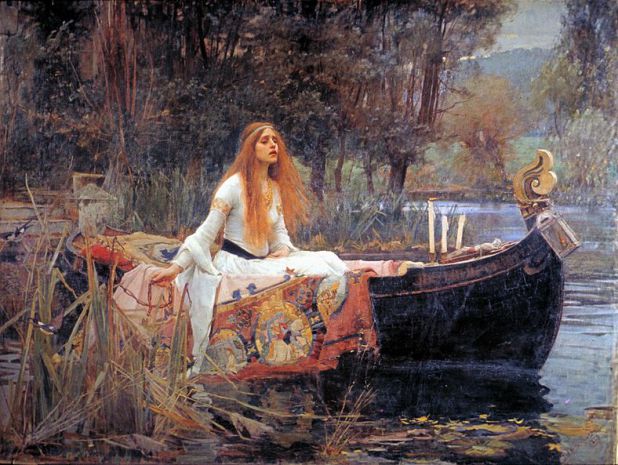
Perhaps before that moment, Arthur had thought those visits were mere dreams and imagination. Now he was to learn: imagination can lead to the making of a king.
“Of course it is me,” I said calmly. “Your Uncle Merlin had other plans for you, but it was I who knew your noble calling and prepared you for it. Now! Do not hesitate to do your duty!”
Within seconds Arthur had lifted the sword from the stone.
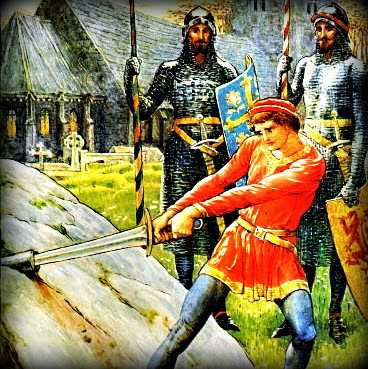
For the doubters among them, Arthur replaced the sword several times. Each time the anvil sealed around it like an iron prison. Many others made attempts at lifting it, each to no avail. Yet Arthur lifted it several times with ease. Finally the crowd conceded; it was Arthur who was meant to rule as King of Britain.
Merlin cowered in a corner, hidden by the crowd. I went to him.
“Do not worry, Uncle,” I said. “While I do not forgive you, I will not torture you. I ask now that you return to Avalon for schooling. You see, your magic has always been imperfect. You have silly ideas. If Arthur is ever to rule as a worthy king, he must not be influenced by your dualistic nature. Therefore I banish you from Camelot.”
He had no choice but to leave.
From that day forward, per my request, all jousting was banned in the kingdom.
As for my son, he became the once and future king, ushering in an era of great peace and prosperity. He ruled with wisdom, kindness and grace, wedding his Queen Guinevere, and appointing twelve worthy knights to his round table.
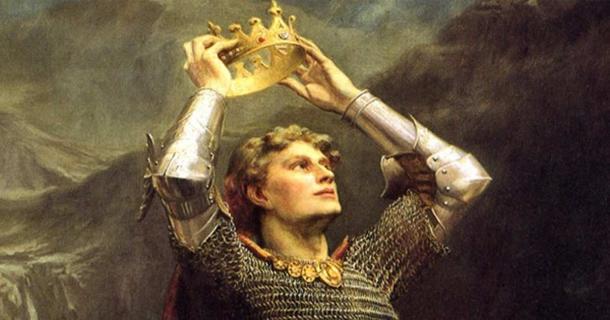
Advertisements Share this:
